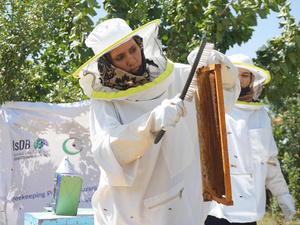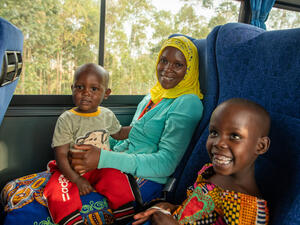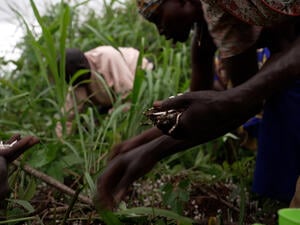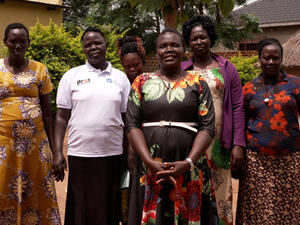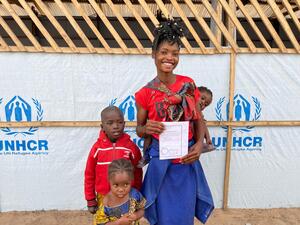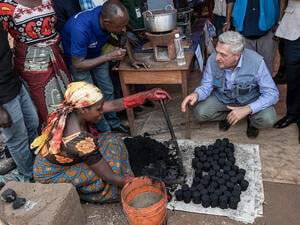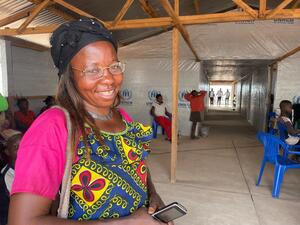For an Angolan refugee, a milestone birthday leads to a momentous decision
For an Angolan refugee, a milestone birthday leads to a momentous decision

Two refugee girls look out the window of the bus as they leave the transit camp of Kimpese situated in the western province of Bas-Congo in the Democratic Republic of the Congo on November 4th, 2011. It is the first repatriation of Angolan refugees from the DRC, in more than four years.
POINTE NOIRE, Republic of Congo, March 1 (UNHCR) - Turning 50 is a milestone in many people's lives, an opportunity to reflect on the path one's life has taken and, often, to plot a new course for the future.
For Gomez, who has been a refugee for most of his adult life, his 50th birthday resulted in a decision, to return home to the village in Angola he fled 33 years ago.
Gomez is among a group of 20 refugees who will be returning under a UNHCR voluntary repatriation programme to the nearby Angolan province of Cabinda He will be among the first of some 800 Angolan refugees who have remained in the Republic of the Congo and are able to go home under a new plan.
"I've founded a family; all my children are born here," Gomez said. "This country will always be important to me. But I am 50 years-old now; it's really time to go home."
His departure from Angola in 1979, when he was a 17-year-old student, had been anything but voluntary. He was living with 7 brothers and a sister, in the village of Likonge, in Cabinda province. Their mother, a widow, was working the land to ensure their survival.
The country was being torn by civil war between former liberation movements; the People's Movement for the Liberation of Angola (MPLA), the National Union for the Total Independence of Angola (UNITA), and the National Front for the Liberation of Angola (FNLA). Gomez was still a teenager and uninvolved when the conflict arrived in their village in 1979.
Gomez's mother feared for her children and joined the people fleeing the violence. "It was not clear for any of us how our life would be, but we left, as did everybody around, to survive. At that time, I was young so I was following the decisions of my mother."
When the family arrived in the refugee camp of Malolo, in the south of the Republic of the Congo, many refugees were already there. Life was hard and Gomez was given advice.
"'If you want to survive here, you have to marry as soon as possible; at least your wife will take care of you. You need to eat'. Luckily, I met the future mother of my children the same year, an Angolan refugee too. My first baby was born right there, in the camp. But I was so happy to become a father."
After nearly 20 years with his family in Malolo, he was again uprooted by another civil war. The inter-ethnic Congolese conflict forced him to flee with his family to Pointe Noire, a city on the Atlantic side of the country.
They have lived there ever since, registered as refugees with UNHCR. He has five children and works occasionally as a nurse. But social traditions have thrown up a new challenge - which strengthened his determination to return to Angola.
"Three years ago, my wife decided to visit Cabinda, with two of our children, just to have an idea how the life has changed. But when she arrived, her godfather said that, after so many years of common law life, we should get officially married. As I have no money for the marriage, they have prevented her from returning. It has been very hard for me."
Since a peace accord in April 2002 ended almost 30 years of conflict in Angola, one of the longest and most brutal civil wars in Africa, thousands of refugees have returned. About 800 Angolan refugees, mostly from Cabinda, still live in the Republic of the Congo.
Gomez and his three remaining children will be among the first 20 refugees from this province to return to Cabinda following an agreement between UNHCR and the governments of the Republic of the Congo and Angola last October. UNHCR is accompanying them home.
"It was not an easy decision," says Gomez, who during his long exile lost three siblings and his mother. "But people who already have left sent us positive messages about the new life there. It gives me strength. Our country is recovering."
Resuming life in Angola may be a struggle. While he remembers the Portuguese he spoke in Angola, his children speak the French of the Republic of the Congo. However, his first priority is to find his wife and convince her family to accept him, despite having no house or land. He loves the woman with whom he raised five children and shared refugee life for 33 years.
"May I ask you to pray for me too to succeed?" he says. "More prayers will help."
By Daniela Livia Bîciu in Pointe Noire, Republic of Congo

